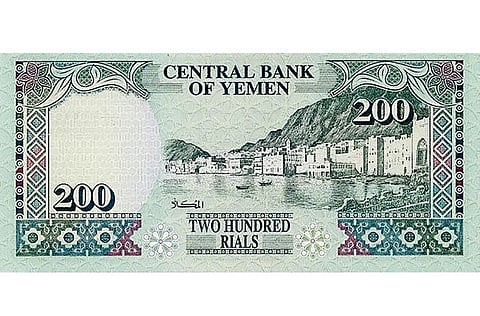Yemeni riyal plunges despite cash injection
Pumping money into exchange market is unable to stabilise currency as it falls to record low against the dollar

Sana'a: Yemen's riyal fell further against the US dollar as the central bank pumped $57 million (Dh209 million) into the exchange market, the latest of a series of cash injections to support the tumbling currency which hit a record low last week.
Nine injections into the market have been unable to stop the continuous fall of the riyal this year, which has fallen almost 16 per cent from a level of 208 against the dollar mid-January.
The currency fell to 242 riyals versus the dollar on Sunday, currency traders in Sana'a said, the worst exchange rate of the riyal in history. They told Reuters they expected the currency to fall further to 250 riyals in the coming week.
The central bank had injected $80 million two weeks ago, but the riyal had continued to fall against the dollar. The decision to pump another $57 million announced late yesterday has also not seemed to stabilise the riyal, an analyst said.
"This is at a critical level," said John Sfakianakis of Banque Saudi Fransi in Riyadh. "The central bank has already injected close to 20 per cent of its reserves."
Sfakianakis said the continuous fall of the riyal in 2010 was due to the political climate.
"The political and security challenges add to the uncertainty about Yemen itself — there are a host of things, the northern war, Al Qaida, pirates," he said.
Yemen is struggling to cement a fragile truce against rebels in the north and curb an increasingly violent separatist movement in the south, while also fighting a resurgent regional Al Qaida wing based in the country.
Vicious cycle
Yemen's central bank blamed the riyal's recent drop on increased demand for foreign currencies to import goods for Ramadan.
Central bank governor Mohammad Awad Bin Hammam told state news agency Saba that speculators may be manipulating exchange rates, which Sfakianakis agreed was likely.
"The local market sees an opportunity to buy dollars because of this uncertainty in Yemen," he said, adding that people may also be fleeing from the riyal due to anxiety spurred by continued injections and their subsequent failure.
"The central bank could fall into a vicious cycle of more injections and increase of interest rates while the riyal continues tumbling. They could easily deplete reserves in this kind of cycle," he said.
A total of $977 million has been injected into the market by the central bank to support the riyal this year, Saba reported.
Bin Hammam said in May that Yemen had $6.1 billion in reserves then compared to $7 billion a year earlier.
Yemen needs international support, Sfakianakis said, either by helping the state subdue political and security challenges or by offering economic aid.



